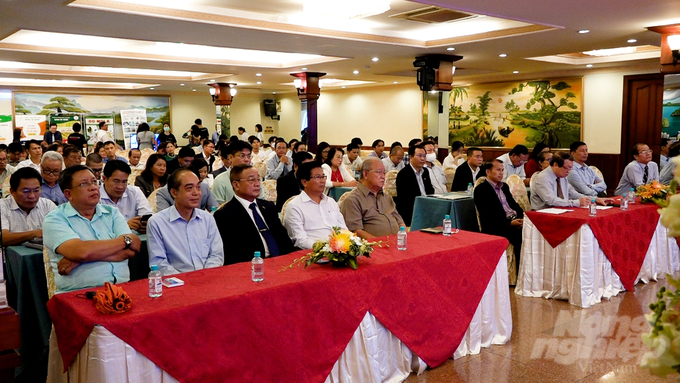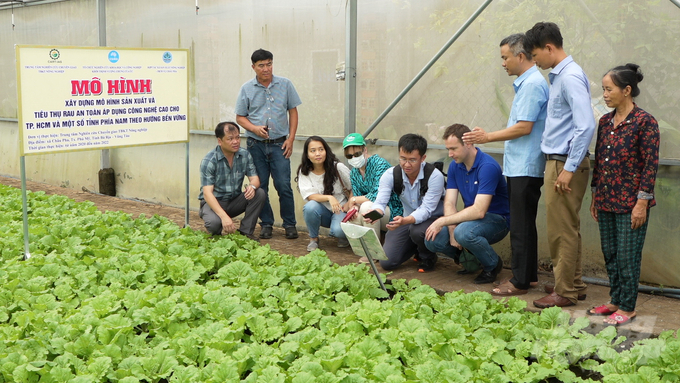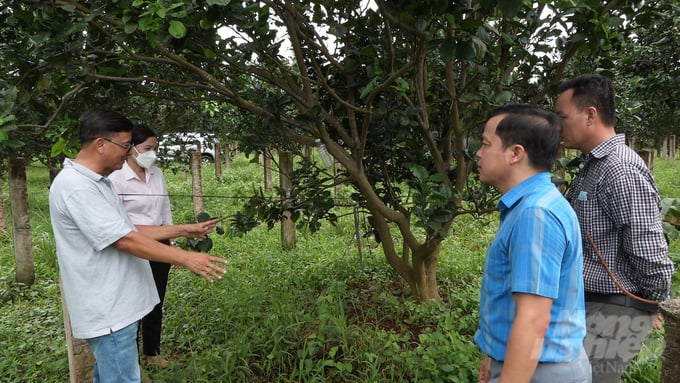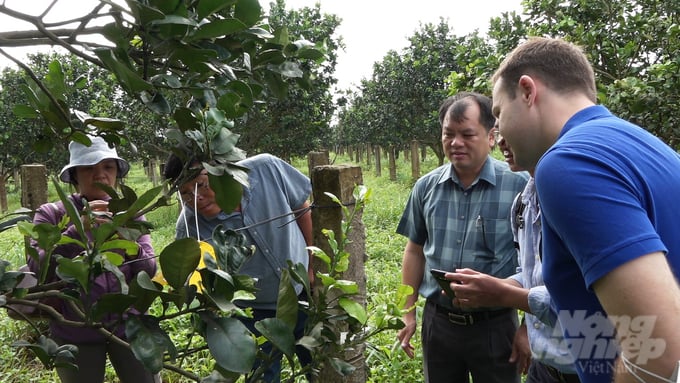November 28, 2025 | 01:01 GMT +7
November 28, 2025 | 01:01 GMT +7
Hotline: 0913.378.918
November 28, 2025 | 01:01 GMT +7
Hotline: 0913.378.918
The Forum on promoting linkages in the value chain of agricultural products, taking advantage of opportunities from FTAs was jointly organized by the Vietnam Gardening Association and the Vietnam Fruit and Vegetable Association in Ho Chi Minh City.

Overview of the Forum on promoting linkages in the value chain of agricultural products. Photo: Minh Sang.
According to the Vietnam Gardening Association, Vietnam's agricultural sector has faced many difficulties and challenges in recent years. Namely, the Covid-19 pandemic, the Russia-Ukraine conflict, and China's Zero-Covid policy in the last two years have significantly affected the production and supply chain of agricultural products. As a result, new-generation free trade agreements such as the EU-Vietnam Free Trade Agreement (EVFTA), the Regional Comprehensive Economic Partnership (RCEP), etc. have created favorable conditions to attract investment in agriculture as well as expand the export markets for commodities and agricultural products.
Mr. Nguyen Duy Luong, Vice Chairman of the Vietnam Gardening Association, believes that Vietnam is curretly facing great opportunities. However, in order to fully utilize these trade and investment opportunities, business farms and agricultural cooperatives must meet the requirements of origin, quality standards and food safety. On the other hand, opening the market also means that Vietnam's domestic agricultural products are under great pressure to compete directly with imported foreign agricultural products in the domestic market.

Agricultural production and trading businesses must promote value chain linkages as well as apply science and technology to production. Photo: Minh Sang.
According to Mr. Luong, in order to improve the quality of agricultural products and overcome the technical barriers of the import market as well as maintain the domestic market share, agricultural production and trading businesses must promote value chain linkages, apply science and technology to production, complete infrastructure and establish a production management system. Ultimately, they need to create quality, safe products with high added value.
Regarding the situation of linking the production and consumption of agricultural products, Deputy Director of the Department of Crop Production Le Thanh Tung said that Viet Nam currently has around 18,760 agricultural cooperatives, 81 cooperative unions, with a total of approximately 3.23 million members. The total number of regular employees in agricultural cooperatives is estimated at 550,000 people. The management staff of agricultural cooperatives is nearly 51,000 people. There are 4,339 agricultural cooperatives committed to consuming agricultural products, which is equivalent to 24.5% of the total number of cooperatives (this rate was only 5 to 7% before 2015).
There are multiple actors participating in the value chain of association-processing-consumption of agricultural products, including 271 scientific organizations, 586,585 farmer households, 4,028 agricultural cooperatives and 1,867 businesses. The main types of association are product consumption linkages through contracts, partnerships supporting investment and product consumption, linkages in closed value chains or vertical linkages between businesses and cooperatives, farmer households; horizontal linkages between businesses.
According to Mr. Tung, although the number of cooperatives committed to consuming agricultural products and the number of linked chains is gradually increasing in recent years, there has been no linkages that create a brand.

It is necessary to improve the relationship between farmers and businesses in the linkage, so that the two actors can commit to sharing benefits and cooperating in increasing the value of agricultural products. Photo: Minh Sang.
Realistically speaking, "distrust" issues often arise between businesses and farmers. Therefore, it is necessary to improve the relationship between farmers and businesses, and the regional linkage must be sustainable for both actors in the process of producing and consuming agricultural products. The chain link is only effective when the two actors commit to sharing benefits and cooperating in increasing the value of agricultural products.
It is important to change people's mindset regarding the association of production and consumption of agricultural products. Individuals must be aware of their responsibilities as well as rights in the association. “Many farmers are concerned about the benefits of joining in an association. The simple answer is that it can help them sell products”, said Mr. Tung.
Tran The Nhu Hiep, Deputy General Director of the NHO-QSCert Certification Organization also said that: “In order to control quality throughout the value chain, the actors participating in the chain must innovate the management process as well as apply advanced technologies such as barcodes, growing area codes, geographical indications, etc., so that customers can trace the origin in the most detailed manner, thereby creating a reputation to strengthen the product's brand in the market. "
According to Mr. Hiep, in the production and trading of any product including agricultural ones, the first aspect to determine is the product itself, the buyer and the method; only then can businesses develop an effective production and business plan. Accordingly, the selection of product must be based on the needs of the buyer, and the seller cannot be limited to currently available wares. Once the market need is identified, a plan must be devised to meet such demand.

The actors participating in the value chain must innovate the management process and apply advanced technologies. Photo: Minh Sang.
The most effective solution to improve product quality is maintaining a stable and sustainable source of raw materials in addition to joining the logictics chain. If this approach is successful, production linkages will improve the quality and value of agricultural products while also increasing economic efficiency. High-quality goods will reduce the competition. Moreover, it will add cultural value of the product.
Translated by Nguyen Hai Long

(VAN) After the institutional merger, Da Nang possesses significant forest-carbon reserves and is proactively engaging in the carbon market, creating a new revenue stream.

(VAN) An Giang strengthens communication against IUU fishing, increases inspections and sanctions, and is determined to remove the EC’s “yellow card” while developing a sustainable fisheries sector.

(VAN) As green transition becomes a global trajectory, Viet Nam’s biggest challenge is not only technology and models, but how to ensure that capital flows reach the right beneficiaries.

(VAN) The Ministry of Agriculture and Environment must spearhead the construction of green governance, spanning decision-making processes and investment standards to policy evaluation mechanisms.

(VAN) The Agriculture and Environment sector of Khanh Hoa has achieved numerous milestones over the past 80 years, contributing significantly to the goal of establishing the province as a centrally governed city by 2030.

(VAN) Viet Nam is entering the pivotal period of 2025-2030, moving toward the formulation of the Remote Sensing Law, which will establish a legal foundation for the development of national digital data.

(VAN) The agricultural sector is finalizing the strategic framework for emission reduction, setting the goal of sharply cutting methane and 403.7 million tons of CO2 equivalent and moving toward Net Zero by 2050.